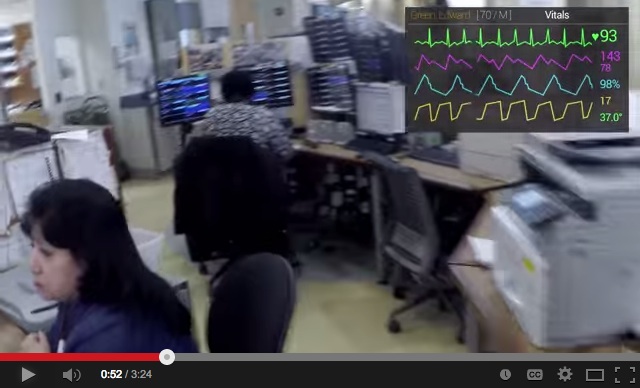 Google Glass startup Wearable Intelligence, which, among other things, outfits Google Glass devices for use in hospitals, has raised just under $8 million, according to a report in Fortune. The round was led by Lightspeed Venture Partners, whose parnter Barry Eggers also joined the board.
Google Glass startup Wearable Intelligence, which, among other things, outfits Google Glass devices for use in hospitals, has raised just under $8 million, according to a report in Fortune. The round was led by Lightspeed Venture Partners, whose parnter Barry Eggers also joined the board.
This is the first funding the company has announced, but Fortune reports the company previously raised seed funding from Andreessen Horowitz, First Round Capital, Google Ventures, Kleiner Perkins Caufield & Byers, Initialized Capital and Subtraction Capital.
According to its website, Wearable Intelligence is actually developing custom Google Glass software for both the energy and healthcare industries, with additional use cases planned. In healthcare, however, Wearable Intelligence is best known as the company working with Beth Israel Deaconess Medical Center's emergency department, which currently has four glass devices shared among 10 emergency physicians. Primarily, Wearable Intelligence helps the hospital use Glass in a safe and secure way.
To address HIPAA and FDA concerns, Beth Israel uses Glass as a client to display information that’s stored on the hospital server — something slightly easier for Beth Israel, because it has an in-house EHR that made integration easier. There are three authentication safeguards for the devices, which are also kept at the hospital in a locked safe. First, they don’t work at all outside of the hospital’s secure WiFi. Second, when the physician puts on the Glass, he or she has to scan a personal QR code in order to access any data. Finally, to access patient data, physicians must scan a second QR code on the wall of the patient’s room. On his blog, Beth Israel CIO Dr. John Halamka shared a story about using the technology earlier this year.
“For example, I was paged emergently to one of our resuscitation bays to take care of a patient who was having a massive brain bleed,” he wrote. “One of the management priorities for brain bleeds is to quickly control blood pressure to slow down progression of the bleed. All he could tell us was that he had severe allergic reactions to blood pressure medications, but couldn’t remember their names, but that it was all in the computer. Unfortunately, this scenario is not unusual. Patients in extremis are often unable to provide information as they normally would. We must often assess and mitigate life threats before having fully reviewed a patient’s previous history. Google Glass enabled me to view this patient’s allergy information and current medication regimen without having to excuse myself to login to a computer, or even lose eye contact.”
Wearable Intelligence is one of at least six startups focused on bringing glass into healthcare as an enterprise device. Another company, Pristine, advertises the fact that it offers a stripped-down version of Glass in order to keep it HIPAA compliant. So far, the company has launched two products, EyeSight and CheckLists.
Augmedix, which offers a Google Glass clinical documentation program for physicians, has already graduated out of an accelerator, Rock Health, with $3.2 million in funding and early data from doctors who have used the program. Augmedix now has 36 employees, is venture-backed, and is “hiring across the board”, according to co-founder Ian Shakil. The company did a study in the fall of 2013 to see if 300 patients at three different pilot sites would be comfortable with their doctors using Google Glass, they found 99 percent were comfortable with it.
Remedy, launched a pilot in May at three Harvard hospitals in which they provided physicians assistants who were handling night coverage in hospitals with Google Glass, so that they could send their point-of-view videos to supervising doctors. From this pilot, Remedy will measure how much the Google Glass system changes the status quo for how healthcare providers manage the workflow of cases. TechCrunch just reported that 91 percent of physicians found it useful. The company also wants to measure patient perception and adoption rates on the surgeon side and the physician’s assistant side.
In June, a fifth startup joined the ranks of entrepreneurs focused on the point-of-care opportunities for Glass. Yosko, a hospital software startup that is now a veteran of three digital health accelerators, geared up to launch pilots with as many as five hospitals this year. The Cambridge, Massachusetts-based company just graduated from the Sprint-TechStars accelerator and is developing its software for two platforms — the iPad and Google Glass.
And another startup, CrowdOptic, is in use at Stanford University Medical Center and UCSF, where its software is being used to train cardiothoracic surgeons.














